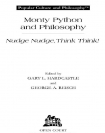Monty Python and Philosophy, Gary Hardcastle [portable ebook reader TXT] 📗

- Author: Gary Hardcastle
Book online «Monty Python and Philosophy, Gary Hardcastle [portable ebook reader TXT] 📗». Author Gary Hardcastle
Luckily, another Python sketch can be used to rescue philosophers from the charge that to the extent that their arguments are based on bizarre examples they are irrelevant to discussions of real moral issues. In the “Police Station” sketch (Monty Python’s Flying Circus, Episode 7, “You’re No Fun Anymore”) a Scotsman, Angus, reports to the police that a giant blancmange has eaten his wife, and the following exchange ensues:
DETECTIVE: Are you mad?
ANGUS: No, sir.
DETECTIVE: Well that’s a relief. ’Cos if you were, your story would be much less plausible.
Like the detective, we usually believe that it’s a good thing to tell the truth to the police. So, were Angus mad and his story less plausible as a result, we would normally think that this was regrettable. (This is why the detective was relieved that Angus was sane!) However, since it would be better for there not to be carnivorous blancmanges roaming around England eating people’s wives it would be better overall were Angus’s tale to be the product of madness. In this sketch, then, the joke’s on everyone who holds the common-sense view (implicitly expressed by the detective when he says that he’s relieved that Angus’s story is plausible) that it is always better to report true things to the police, for in this particular situation everyone can see that it would be better were Angus not to be telling the truth.
The way in which this sketch works thus has a great deal to teach us about the usefulness of philosophical examples for addressing practical, as well as theoretical, issues in ethics. Just as in the sketch “Complaints” the Pythons derived humor from the type of thinking about thinking that is the basis for the value of philosophical examples, here they derive humor from the related philosophical technique of the “thought experiment.” Like scientists, philosophers also test their hypotheses through performing experiments. However, since philosophers’ hypotheses concern conceptual claims such as “Stealing is always immoral,” they are tested through constructing examples that are designed to discover whether any exceptions could be found that would undermine the conceptual claim that is at issue. Once we see that this is how philosophers work, we can see that the Python sketch “Police Station” is in the form of a philosophical thought experiment that is designed to show the falsity of the commonsense claim that “It is always better to tell the truth to the police than to tell them falsehoods.” We can test this claim by seeing if there are any counterexamples to it. That is, we can test it by seeing if there might be any cases where it would be better were someone to be telling the police falsehoods rather than the truth. And, of course, the case of Angus is such an example, for it would be better if his tale of the carnivorous blancmange were to be false.
Yet philosophical thought experiments don’t only enable us to test individual hypotheses, such as that tested in the sketch “Police Station.” Rather, by developing a series of such thought experiments philosophers can help both themselves and their audience develop a more nuanced view of an issue. To illustrate this, let’s look at how the philosopher Judith Jarvis Thomson uses thought experiments to address the question of the morality of abortion. Thomson asks us to imagine that
You wake up in the morning and find yourself back to back with an unconscious violinist . . . . He has been found to have a kidney ailment . . . the Society of Music Lovers has kidnapped you, and last night the violinist’s circulatory system was plugged into yours, so that your kidneys can be used to extract poisons from his blood as well as your own. . . . But never mind, it’s only for nine months.86
Thomson asks us whether we would consider it morally permissible to unplug the violinist, knowing that if this is done he will die? Thomson expects that most people would say that it is morally permissible to unplug him in these conditions, even if we know that he will die as a result. If she’s right, then we know that most people do not believe that a person has a moral obligation to use her body to support the life of another for nine months if she had nothing to do with him coming to be attached to her. But this type of involuntary attachment does not only occur in fictitious cases dreamt up by philosophers after a few pints and choruses of “Bruces’ Philosophers Song.” It also occurs in the real world. A woman who becomes pregnant through rape will have to decide whether to allow her body to be used by the fetus for nine months, where she came to have it through no action of her own, or whether she should “unplug” it from her. Thus, if you think that it is morally permissible





Comments (0)